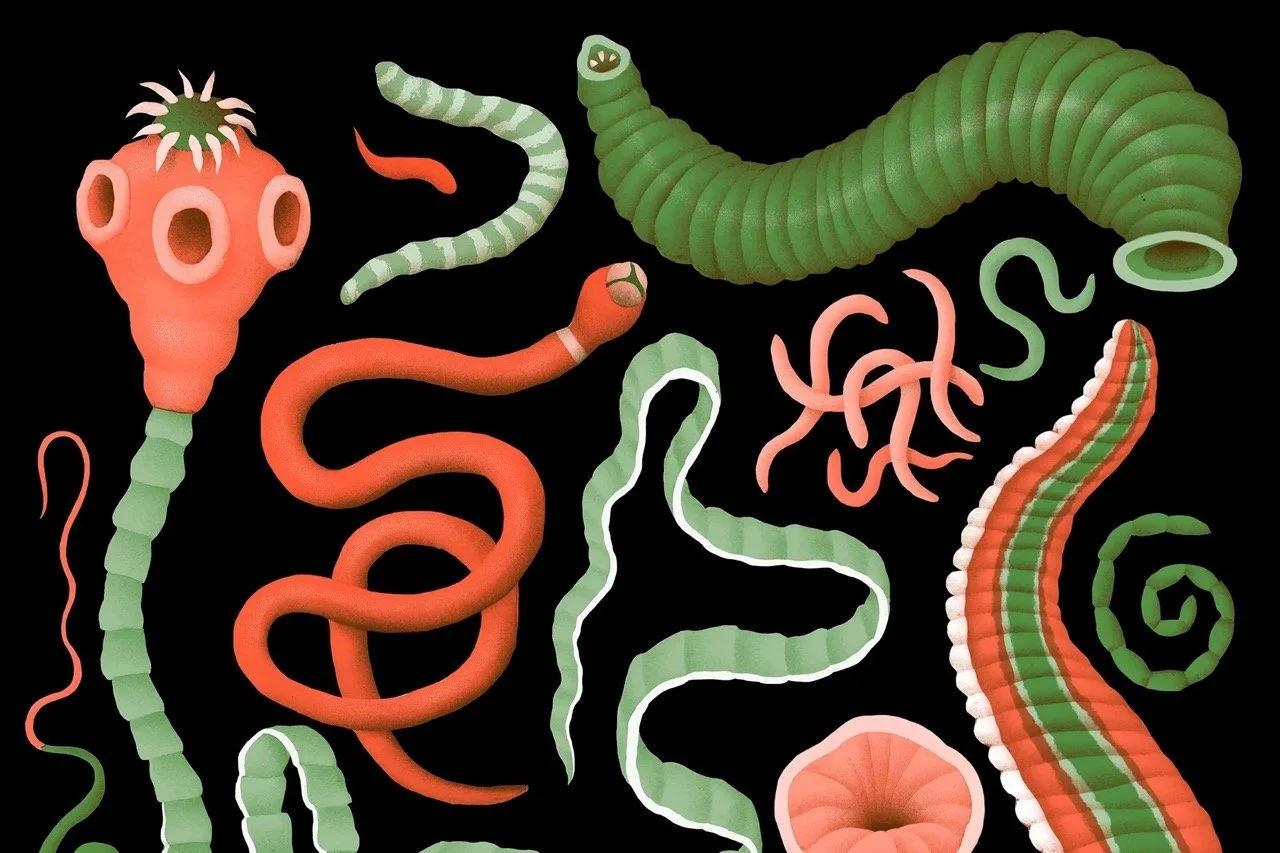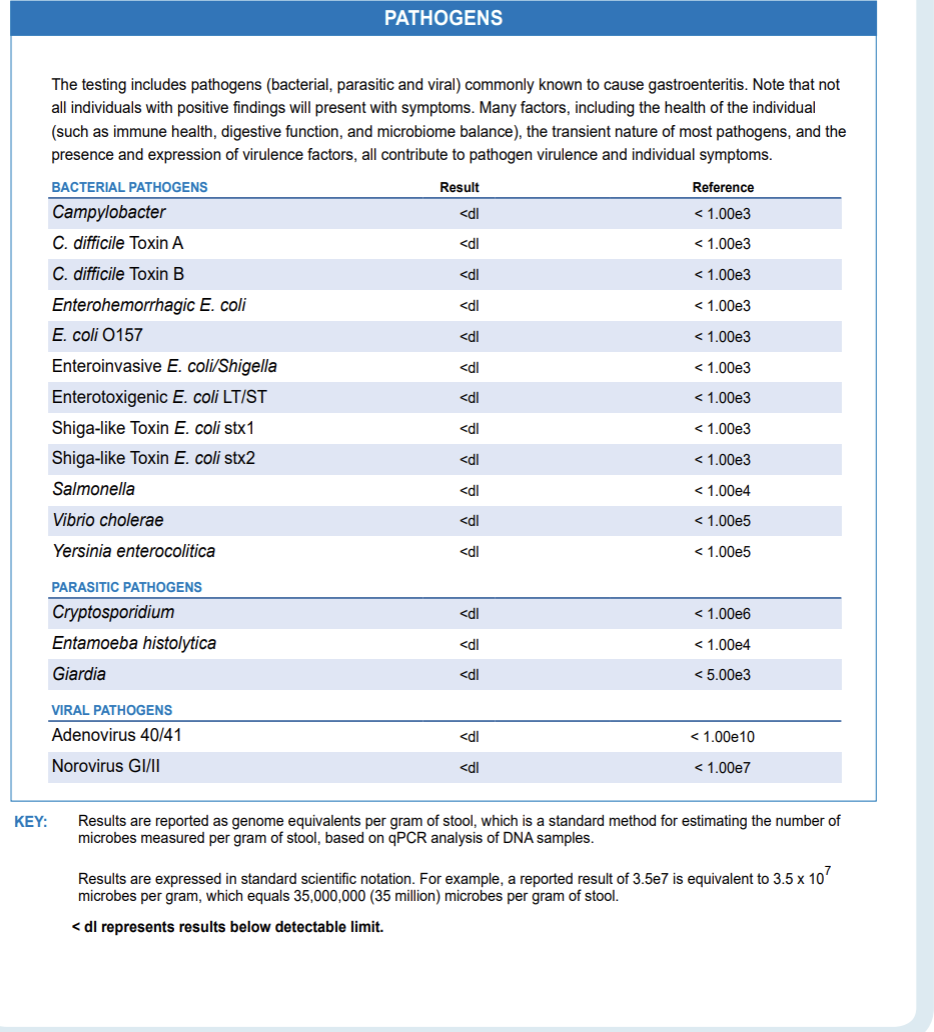Parasites: Keeping Unwanted Guests Out of Your Gut
Parasites are unwelcome guests that can take up residence in your gut and even migrate to other organs, causing a range of unpleasant symptoms and affecting your overall health. While the thought of these tiny organisms living inside you might be unsettling (I mean, just the thought of it makes me want to crawl out of my skin), the good news is that they can be effectively treated.
In this article, I’ll be exploring the different types of parasites, the symptoms they cause, and how to address them both conventionally and naturally. Bye-Bye!
Types of Parasites
The term "parasite" encompasses a diverse group of organisms, each with its own characteristics and preferred habitat within your body. Parasites live on or in another organism (the host) and get their food from or at the expense of their host. When we hear about parasites, we often think of worms, but there are actually three main types of parasites that can affect humans:
Protozoa: Microscopic, single-celled organisms that can cause infections like giardiasis (Giardia), amoebiasis (Entamoeba), leishmaniasis, malaria, and cryptosporidiosis.
Helminths (Worms): Multicellular worms that can be flat or round. Common examples include tapeworms, roundworms, pinworms, and flukes. They can reside in many parts of the body, most commonly the intestines, liver, or lungs.
Ectoparasites: These live on the external surface of the host (skin or scalp) and feed on the host's blood or skin. They include insects like lice, fleas, mites, and ticks.
Symptoms of Parasites
While some people with parasites experience no symptoms, others may notice a range of issues that can significantly impact their quality of life. Common symptoms of parasites include:
Digestive problems: Bloating, gas, diarrhea, constipation, and abdominal pain are frequently reported.
Fatigue and low energy: Parasites can drain your energy, leaving you feeling constantly tired and sluggish.
Skin problems: Eczema, acne, and other skin conditions can be linked to parasitic infections.
Weight changes: Both unintentional weight loss or gain can occur due to parasites disrupting nutrient absorption.
Weakened immune system: Parasites can compromise your immune system, making you more susceptible to other infections. Conversely, a weakened immune system can make individuals more susceptible to parasitic infections.
Food cravings: Unusual cravings, particularly for sugary or starchy foods, can be a sign of parasites but also of fungal or bacterial infections.
Testing for Parasites
Diagnosing a parasitic infection can be challenging, as parasites can be elusive and difficult to detect. While stool tests are commonly used to identify intestinal parasites, they may not always be accurate, especially for parasites with complex life cycles or those that are present in low numbers. Other tests, such as blood tests and imaging scans, may be needed depending on the suspected type of parasite and its location in the body. I have another article on parasite detection, which I recommend you read as well.
It's important to note that some parasites can remain hidden for long periods, making diagnosis even more difficult. Pictured below is the first page of a GI-MAP report looking for pathogens, including certain parasites. If testing for parasites specifically through stool, I recommend collecting your sample around the full moon as parasites are known to be more active (and reproducing) during that time, increasing the chances of being discovered if they are indeed present. Sounds woo-woo, except it’s not. It is mainly due to changes in our body’s circadian rythm during full moon, but that’s a topic for another day.
One other potential indicator of a parasitic infection is elevated eosinophils count on a complete blood count (CBC) panel.
Eosinophils are a type of white blood cell that plays a role in fighting parasitic infections. However, it's important to remember that elevated eosinophils can also be caused by other conditions, such as allergies or autoimmune disorders.
Therefore, a thorough evaluation, including a detailed history along with appropriate testing, is crucial for accurate diagnosis and effective treatment of parasitic infections.
Conventional and Natural Approaches for Treatment
If you suspect you have a parasitic infection, it's important to consult a health practitioner for proper diagnosis and treatment. Depending on the type of parasite and the severity of the infection, your doctor or practitioner may recommend the following:
Conventional Treatment
Anti-parasitic medications: These medications directly target and kill the parasites to eliminate the infection. The specific medication prescribed will depend on the type of parasite and its location in the body. Some common anti-parasitic medications include:
Mebendazole: Effective against a wide range of intestinal worms, including roundworms, hookworms, and whipworms.
Albendazole: Similar to mebendazole, but also effective against some tapeworms and flukes.
Ivermectin: Used to treat various parasitic infections, including scabies, river blindness, and strongyloidiasis.
Praziquantel: Primarily used to treat fluke infections, such as schistosomiasis.
Nitazoxanide: Effective against a variety of intestinal parasites, including Giardia and Cryptosporidium.
Natural Treatment
While scientific evidence supporting the effectiveness of natural remedies for parasitic infections is often limited, some herbs have traditionally been used for this purpose. It's important to note that these remedies should not replace conventional medical treatment and should always be used with caution and under the guidance of a qualified health practitioner.
Black walnut hull: The hull of black walnuts contains juglone, a compound with potential anti-parasitic properties. May be effective against certain types of worms.
Wormwood: This herb has traditionally been used as an anti-parasitic agent. May be effective against certain types of worms.
Mimosa pudica: This plant has been used in traditional medicine for its anti-parasitic properties. May be effective against certain types of worms, as well as Giardia and Entamoeba.
Garlic: Garlic has been used for its antimicrobial and anti-parasitic properties. May be effective against Giardia and other intestinal parasites.
Neem: Neem leaves and oil have been used in traditional medicine for their anti-parasitic properties. May be effective against some types of worms and protozoa.
Oregano oil: Oil of oregano contains carvacrol, a compound with potential anti-parasitic properties. May be effective against Giardia and other intestinal parasites.
Cloves: Cloves contain eugenol, a compound with potential anti-parasitic properties. May be effective against some types of worms.
Wormwood: This herb has traditionally been used as an anti-parasitic agent, although research on its effectiveness is limited.
Note: It's important to consult with a qualified health practitioner before using any natural remedies for parasite treatment. Some natural remedies can interact with medications or have side effects, and it's important to ensure they are appropriate for your individual situation.
Depending on the severity of the infection, supportive care may be needed to manage symptoms and prevent complications. This can include:
Fluid replacement: To address any dehydration caused by diarrhea or vomiting.
Nutritional support: To ensure adequate nutrient intake, especially if the parasite is affecting nutrient absorption.
Pain management: To alleviate discomfort caused by the infection in severe cases.
Keeping Parasites at Bay
The best way to deal with parasites is to prevent them in the first place. This starts with a strong digestive system and proper stomach acid production. Here are some other simple yet effective steps you can take:
Wash your hands frequently: This is especially important after using the bathroom, before eating, and after handling raw meat or fish.
Cook food thoroughly: Ensure meat and fish are cooked to the recommended internal temperature to kill any potential parasites.
Wash fruits and vegetables: Wash all produce thoroughly, especially if you're eating it raw. Avoid raw vegetables when visiting a developing country.
Avoid contaminated water: This goes without saying; don't drink or cook with untreated water.
Get regular checkups: Regular visits to your healthcare provider can help detect and treat parasite infections early.
These are especially important when you travel to other countries where sanitary measures might differ. By following these preventive measures and seeking appropriate treatment if needed, you can keep these uninvited guests out of your gut and maintain optimal gut health.


